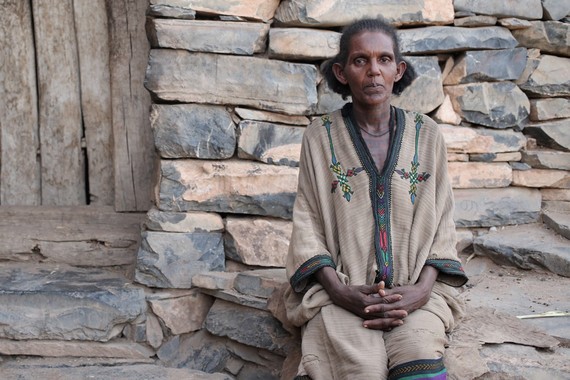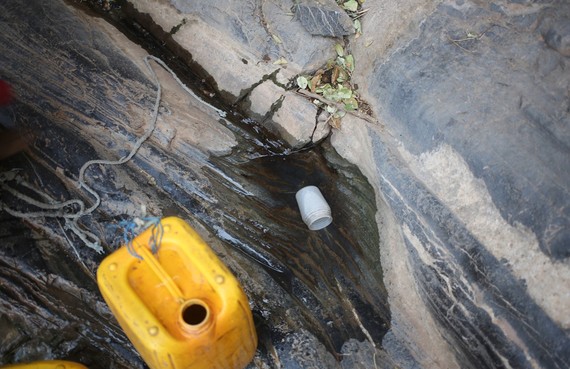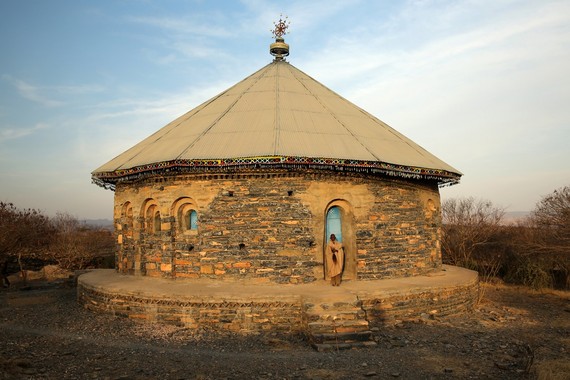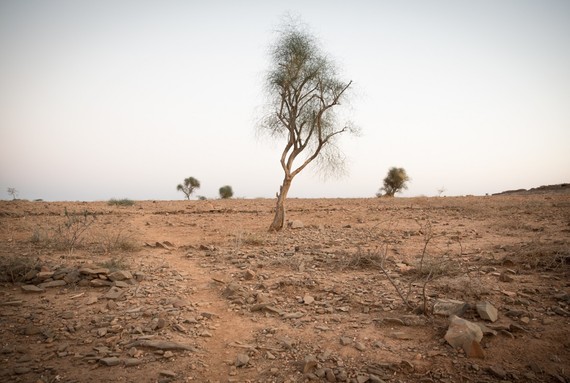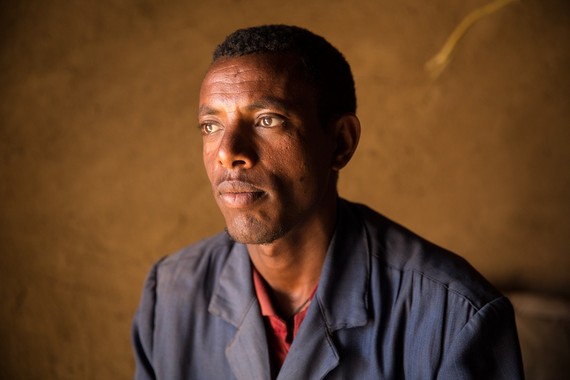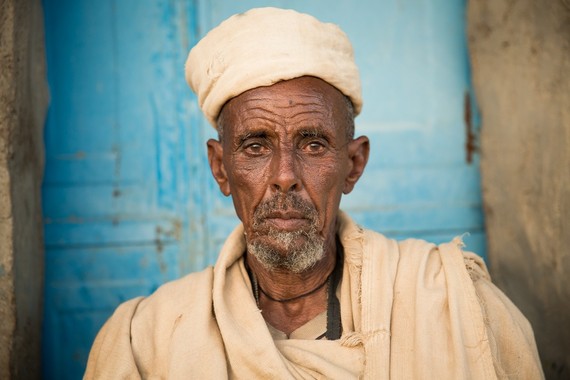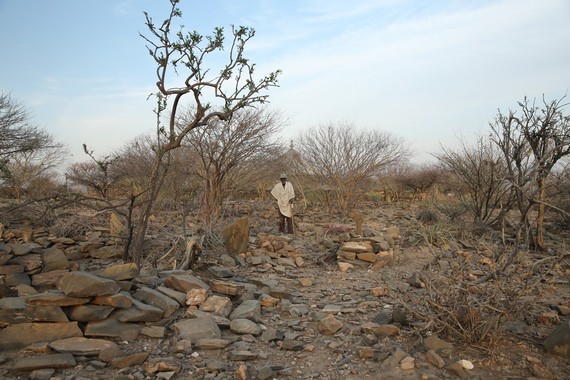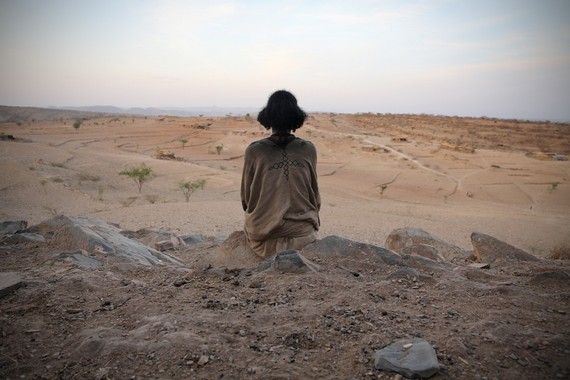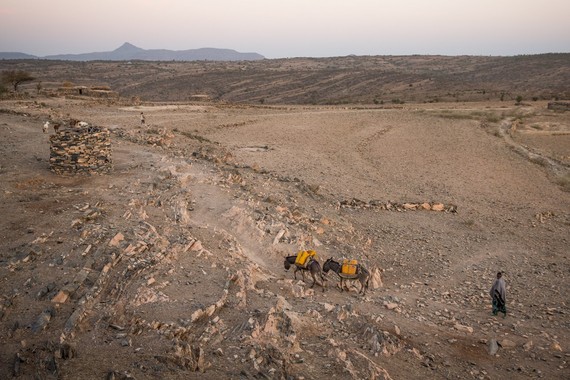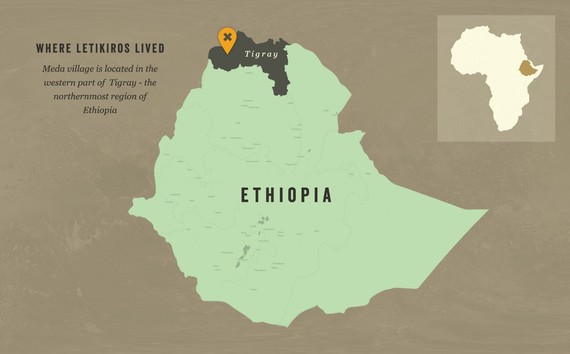It was still dark and cool when 13-year-old Letikiros walked out the door to get water. She never came home. At 4 p.m. a man found her lifeless body swinging from a tree, a rope tied around her neck.
Meda is a large village of dust and rocks that sits on an Ethiopian plateau and sprawls from north to south over several miles. A steep gorge 100 stories deep cuts the village in half, with treacherous dirt footpaths snaking up and down both sides of the mountains, connecting the two sides. Arliew Spring, one of the village's sources for water, is at the bottom of the gorge. There's no bank in Meda, no post office, and no general store. There are no power lines or cellular towers. There's no place to buy a Coke, a bottle of water, or AA batteries. A dozen eggs costs only six cents and while they are small, they are most certainly organic.
Letikiros Hailu was born in the south side of Meda and inherited an impossibly difficult life from her mother, Chekolech. The difficulties started when Chekolech moved reluctantly to the village 25 years earlier in an arranged marriage. It was her bad luck at the time that her new husband happened to live in Meda, for she'd heard of the severe water problems facing women there. Yet she had no choice but to follow her parents' wishes, and she packed up her things obediently.
Her husband turned out to be a brutal man, beating her daily. When Letikiros was 4 years old, her mom had had enough of the abuse and divorced him with the support of the village elders, shooing him out of town -- perhaps before he could harm her daughter as well.
Letikiros was a special girl.
From a young age, she seemed unwilling to just accept the fate of an ordinary girl's life in Meda. Her friends and neighbors described her as visionary and unique. She was bright. She was beautiful. She was clever.
Gifted or not, like all girls her age in Meda, most of Letikiros' time was spent walking and waiting for water. Her first walk was at 8 years old, and her life would change forever after that moment. She'd now get up early four days a week, grab her clay pot, tie it to her back with a rope, and head to the water source to do her part for the family.
Arliew Spring was the closest source to home, but it involved a dangerous and steep climb down a 700-foot cliff. The rocks were loose and slippery, and women had been known to fall to their death on this path. Once at the dry ravine at the bottom, Letikiros would have to scramble up over giant rocks to reach the spring, which wasn't much of a spring at all. Only enough water seeped out of the rock to fill a few clay pots every hour, and the source was shared at night by monkeys, whose excrement surrounded the area.
Often, Letikiros would arrive at the spring and wait up to 8 hours for her turn. Sometimes, she'd find the line of pots and women so long that her walk down would be in vain, and she'd climb back up the hill and head to the Bembya River for water.
The Bembya River was much farther away. It was a 6 hour round-trip to the West and boasted an even deeper descent, but it also showed a much prettier view as the rocky path led towards the foot of the towering Simien Mountains. Although the water wasn't clean, there was no shortage of it and no waiting time as the river flowed freely through the deep gorge. On these long water walks with her friends, Letikiros would talk and dream about a better life for the people of Meda.
"Things will be changed for us if we work hard and fight to improve our lives!" she would say.
She walked four days a week for water, and attended school part-time the other three days. Since there was no school in Meda then, reaching the classroom in a neighboring village was another 6 hour round trip walk. In order for Letikiros to be able to attend school at all, her mother would pay to rent a donkey each week which could carry four pots of water on a single trip from the Bembya River. But there simply wasn't enough money to relieve Letikiros of her water duty altogether, and she quickly fell behind. By the age of 13, she had only completed the third grade.
Following tradition like her mother, Letikiros was also given to be married at a young age. But her mom wasn't going to see history repeat itself and chose for her 13-year-old daughter a young and handsome priest's servant named Abebe. They were childhood friends, so falling in love was easy. Abebe was thin and tall and walked softly. He had a kind, gentle voice and thankfully bore little similarity to Letikiros' father.
"She was beautiful to me. We were in deep love," he said of Letikiros.
They married at the village church in January, and Abebe moved in with his new wife and mother-in-law. Although most girls in Meda immediately dropped out of school when they got married, Letikiros insisted on continuing, and even with another member in the house now, the new and larger family continued to rent donkeys for water so she could attend class. Abebe spent his days serving the priests at the church, earning precious little money. Letikiros spent her days walking and waiting.
In the evenings, they ate together and dreamed about an easier life.
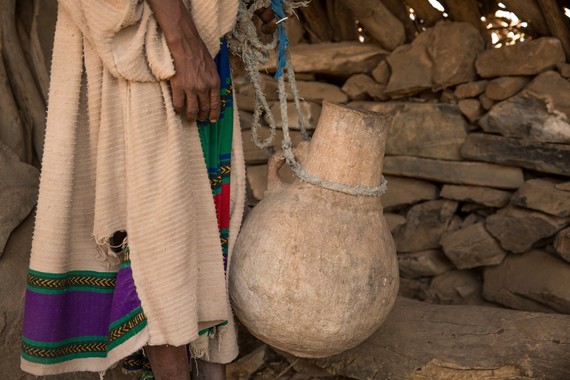
Yeshereg holds one of the clay pots she and Letikiros used for fetching water. They weigh about 10 pounds empty, and more than 40 pounds full.
On May 19, 2000, Letikiros set out before dawn for Arliew Spring. She didn't eat breakfast, probably thinking she'd arrive at the spring before most of the others and have a shorter wait. May is the hottest and driest month in Tigray, and when she joined her friend Yeshareg on the path, they traveled together down the treacherous hill.
Upon reaching Arliew spring, they quickly found out they weren't the only ones who had the idea to leave before dawn. They waited in line all day before filling up their pots and heading back up the cliff together. They reached the peak around three p.m. and, at the place where the road forked, Letikiros said goodbye and took a right towards her house. It was the last time Yeshareg saw her friend alive.
No one will ever know exactly what went through the mind of Letikiros in the moments that followed. What is known, is that she somehow slipped and fell, smashing her clay pot full of water into small pieces. She must have watched in horror as the water spilled out on the dusty ground and abruptly considered the harsh reality of her situation. More than 10 hours of walking and waiting had been undone through a simple misstep.
Those who knew her well believed she must have been overcome with shame.
She knew her mother and sister were at home waiting for the water.
She knew they needed her water to cook dinner.
And now, even the clay pot was destroyed -- a valuable asset for the family.
So rather than continue home down the path empty handed, the 13-year-old child slipped the rope from the pot through the branches of a tree, then around her neck and hung herself.
Less than an hour later, 56-year-old Gebre Egziabher was passing by and saw Letikiros' limp body hanging there. The clay pot lay broken in pieces. Hearing Gebre's wails of alarm and grief, others from nearby homes soon gathered, and quickly cut her body loose. They covered Letikiros and brought her home.
When Chekolech saw the covered body of her daughter being carried towards her, she became uncontrollable with grief. Throwing herself around in a frenzy, she injured her back -- an injury that still plagues her 14 years later.
Abebe wasn't home that night -- he had traveled to the market in nearby Fiyel Wuha to get provisions. A messenger was sent to tell him the news, and he rushed back to Meda, arriving just after the funeral.
For a time, Abebe became completely unhinged. Friends and priests used words like "mentally abnormal" and "uncontrollable" to describe his state. He fled Meda in grief without his identity papers and was later jailed for eleven days in Bahir Dar more than 100 miles away for not having them. The police there finally let him go, but he was jailed again in another town, this time for a month. His family finally found him, explained the tragic circumstances to the authorities, and brought Abebe back to Meda to heal.
Tekle Haimont led the funeral service, and remembers 1,000 people turning up. "Kids, teens, adults, everyone was participating," he said. Letikiros was dressed and covered in white clothes.
"She was beautiful," Tekle remembers.
Neither Chekolech nor Abebe could afford a tombstone, so Letikiros was laid to rest behind the church under a simple pile of rocks. The broken shards of the clay pot were scattered far from the village where they'd never been seen again.
Both her husband and mother believe that Letikiros' soul rests in heaven with God.
"She was just a child," Abebe said softly.
Letikiros Hailu always wanted to change the lives of the people of Meda for the better. Although she never got the chance in her too-short life, she will be loved and remembered here forever.
Writer's note:
I'd first heard about Letikiros Hailu two years ago in a $10 hotel in Adwa, Ethiopia. I was with a group of charity: water supporters visiting water projects by day and one evening as we ate in the hotel restaurant, the hotel owner abruptly approached our table. Under bright florescent lights, he told our group the story of the girl who hung herself from a tree.
The story seemed far-fetched and intended to shock, and I remember doubting whether I really believed it all. But after confirming the basic facts through village elders, I began re-telling the story often.
"The water crisis isn't about mind-numbing statistics," I'd say. "It's about people like Letikiros Hailu. Real people with names and families. People living without hope and a future."
One day, I decided to go there and see it all for myself. I wanted to see if anything had changed for the village in the 14 years since the tragedy.
It was a 3-hour drive from Mekele and then a 9-hour walk over steep mountains to reach Meda, where I spent five nights living with this amazing community off-the-grid under a crescent moon and falling stars. I traveled there with a translator, and we were welcomed with open arms, fed goat and hard boiled eggs, and welcomed into our host family. I was deeply moved as I walked for water in Letikiros' footsteps, stood beneath the tree where she ended her life, and met the extraordinary people in her life who shared openly and compassionately with me.
I returned home even more committed to help the people of Tigray, and even more passionate about the cause of clean water. I firmly believe now more than ever, that water changes everything.
-- Scott Harrison, founder / CEO, charity: water / February, 2014
________________________________
charity: water has been working in Tigray, Ethiopia with the government and local water partners since 2007 with a vision of 100% clean water coverage. With the help of hundreds of thousands of supporters around the world, we've now funded more than 3,000 water projects in Tigray that will serve over 1.1 million people with clean and safe water near their homes. As our hydrologists haven't been able to find groundwater in Meda, and the Bembya river source is more than 4.5 miles away, bringing clean water to the 2,800 people currently here will be challenging and costly, but we're determined to find a solution, most likely in the form of a piped water system. If successful, we will dedicate the clean water project to Letikiros.
If you'd like to donate to support the work of charity: water or if you'd like to sponsor a village water project, please visit charitywater.org. 100% of all donations directly fund water projects, as a small group of private supporters cover all administrative and operating costs.
